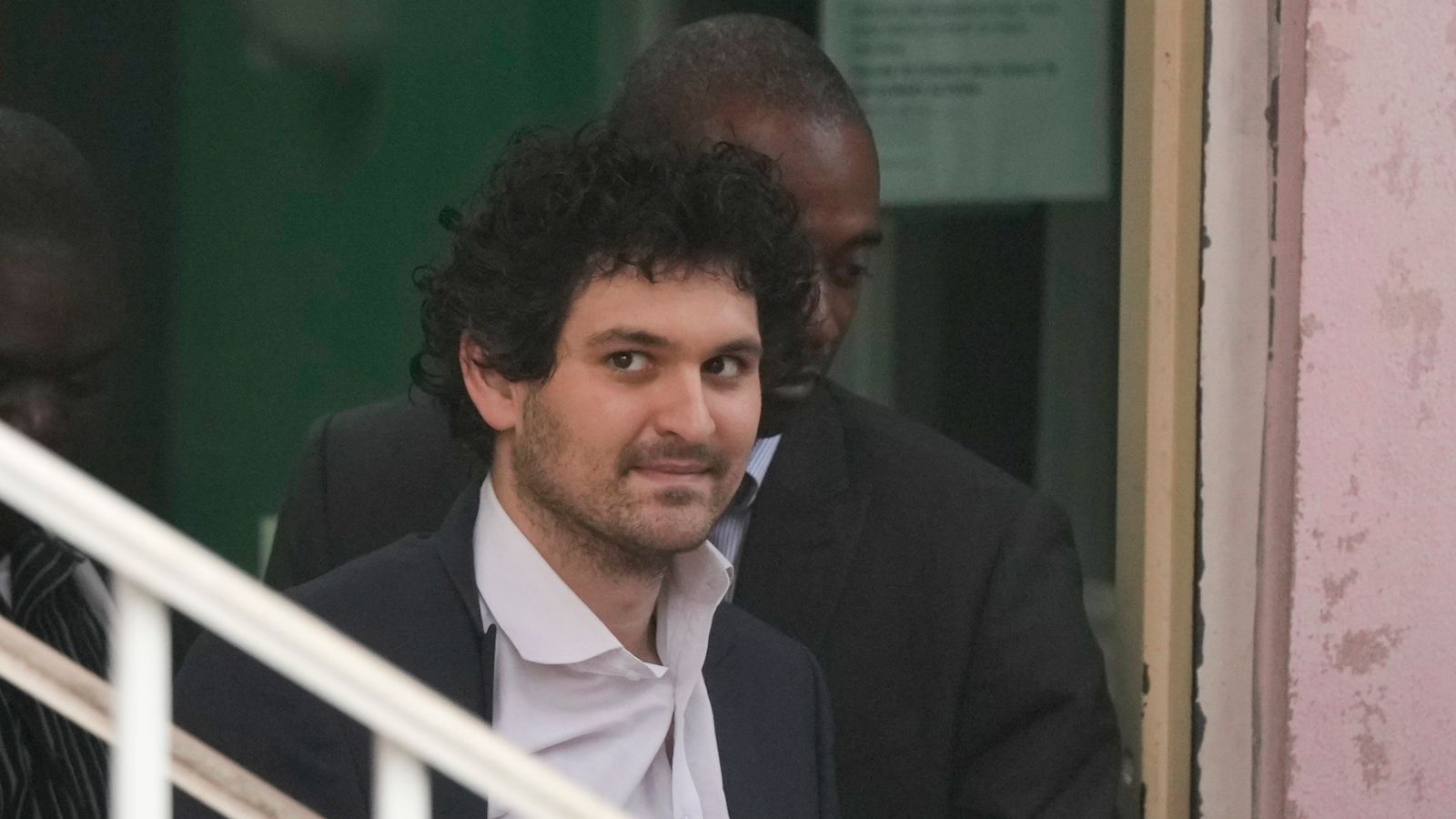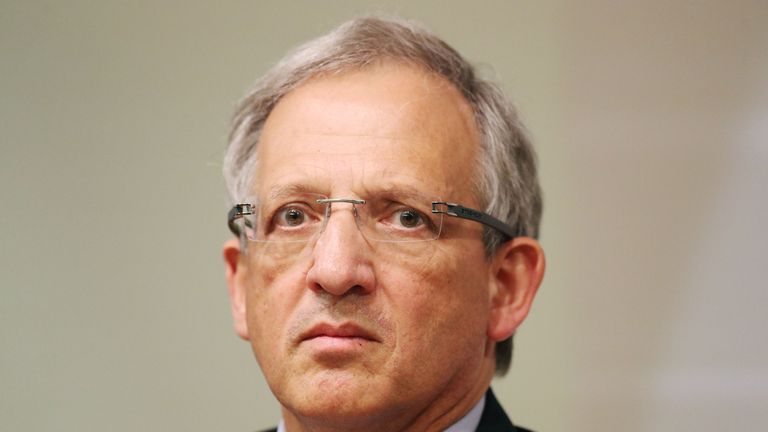Cryptocurrency trading is “too dangerous” to remain outside mainstream financial regulation and could pose “a systemic problem” without action, the deputy governor of the Bank of England has warned.
Speaking for the first time since the founder of the crypto trading platform FTX was arrested and charged with massive fraud, Sir Jon Cunliffe told Sky News the Bank is considering regulation to protect retail investors in the “casino” of crypto trading, as well as the wider financial system from potential crypto shocks.
Sam Bankman-Fried was extradited on Wednesday from the Bahamas to the US where he will appear in a New York court charged with eight counts of fraud, money laundering and breaking campaign finance.
The collapse of FTX left more than one million customers unable to withdraw assets worth an estimated $8bn.
Prosecutors allege he used FTX’s customers’ money to cover losses in his private crypto hedge fund Alameda Capital in what the company’s new chief executive told Congress was “old-fashioned embezzlement”.
An estimated 80,000 of FTX’s customers are based in the UK, with individual liabilities as high as £5m in life savings according to a lawyer acting for dozens of victims.
Louise Abbott, a crypto-fraud specialist, told Sky News: “These individual investors have invested anything from a couple of thousand pounds up to about £5m, so massive amounts of money, all completely frozen, I’m going to use the word frozen rather than lost, because hopefully there is going to be something given back to them at some point. But this is huge money, huge money lost or stuck, or frozen in time.”
Crypto credibility
The episode is a huge blow to the credibility of cryptocurrencies, digital assets that draw their value not from state backing, but from relative scarcity and the willingness of other investors to trade in them.
Mr Bankman-Fried had cultivated links in Washington and on Wall Street, making millions of dollars in political donations and attracting high-profile investors to his platform.
His fall has emphasised the volatility of crypto investment and the lack of regulation in an industry that, despite widespread scepticism, is attracting growing attention from the financial mainstream.
Efforts to regulate
In the UK, regulators have tried and failed to impose their writ on crypto exchanges domiciled offshore, while the government has a goal, set out in April by Rishi Sunak when he was chancellor, to make the UK a “global crypto assets hub”, an ambition that depends in large part on effective regulation.
Sir Jon, deputy governor with responsibility for financial stability, told Sky News the Bank’s regulation efforts were aimed at protecting individuals and maintaining financial stability.
“There’s a lot of activity that’s developed over the last 10 years on the trading and sale of crypto assets, assets without any intrinsic value, so they’re incredibly volatile. And all of that has grown up outside of regulation,” he said.
“What we saw in FTX… is a number of activities which in the regulated financial sector, would have had certain protections. We saw things like clients’ money appears to have gone missing, conflicts of interest between different operations, transparency, audit and accounting. All of the perhaps boring things that happened in the normal financial sector, didn’t really happen in that set of activities. And as a result, I think a lot of people have lost a lot of money.”
Comparing crypto trading to a casino, Sir Jon said investors who wanted to speculate should be able to do so without the risk of losing access to their funds.
“It is in effect, in my view, a gamble, but we allow people to bet, so if you then want to get involved in that you should have the ability to in a place that is regulated in the same way that if you gamble in a casino it’s regulated. You should have the full information on the tin as to what you’re doing.”
The Bank also has to address the risk to financial stability that could flow from digital assets as institutional investors and banks explore exposure to an estimated $1trn in crypto assets.
“This trading of crypto assets was not big enough to destabilise the financial system, but it was starting to develop links with the financial system,” Sir Jon said. “I don’t know how that will develop. But we had banks and investment funds and others who wanted to invest in it. I think we should think about regulation before it becomes integrated with the financial system and before we could have a potential systemic problem.
“So I don’t think it will be possible to say this can be just kept outside of the financial system. It’s too dangerous. I think it is difficult but possible to say, let’s bring it in, where and when we think we can manage the risk to the standards we’re used to.”
Potential for blockchain
While cryptocurrencies have proved consistently volatile since the inception of Bitcoin 14 years ago, the underlying technology, blockchain, is considered to have significant potential across industries to manage data, and speed up and simplify transactions.
Blockchain provides proof of transactions on a public record known as a distributed digital ledger.
Each new exchange of cryptocurrency is recorded on a “block” which is added to the “chain” containing details of the new transaction and the previous transaction, meaning it can only be falsified by altering all previous links.
The system is maintained and overseen by every computer linked to the network rather than a central monitoring entity.
Mercedes is exploring the potential of blockchain to manage the data that will enable autonomous driving, while Vodafone is exploring its utility in managing the billions of micro-transactions that will be facilitated by the next generation of internet technology.
‘Smart money’ could also simplify global supply chains, with the prospect of micro transactions using stable tokens being linked to individual parts in production processes.
“There are technologies here which could, and I stress could, be of real use in the normal financial system, more efficient ways of doing things, potentially more resilient ways of doing things,” said Sir Jon.
“That hasn’t been proven in the crypto world. But if we could provide a regulatory space where people can see if they can develop products using this, we might be able to get the benefit of some of those technologies.”
The Bank of England’s own digital coin
As part of this process the Bank of England is consulting on plans to develop its own central bank digital coin, an electronic version of sterling that would carry the same security as a pound coin, but with the digital flexibility that could one day replace cash.
“Physical cash will always be made available by the bank as long as people want it and many people depend on it. But it’s not fully usable in the way we live now. So the question for the Bank of England is that as the way we as society changes, as we live our lives more digitally, should we continue to provide money to the public which is usable across a range of transactions?
“This would be a digital equivalent of the’ I promise to pay the bearer’ promise, which in the end underpins confidence in money in the UK. Whenever you want, you can turn that money you hold in the bank into basically Bank of England money backed by the state with that promise to pay the bearer.
“We want to ensure that as physical cash becomes less usable in many parts of the economy, perhaps we need to offer something digitally to provide that underpinning.”

